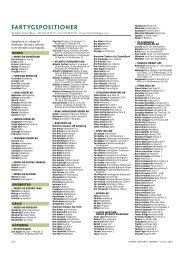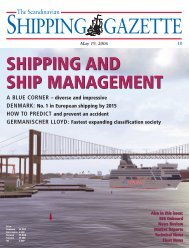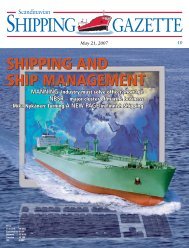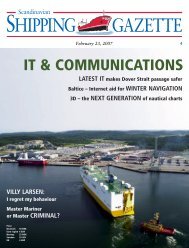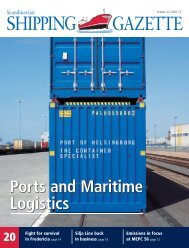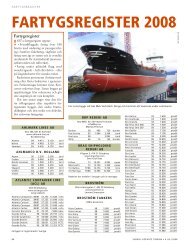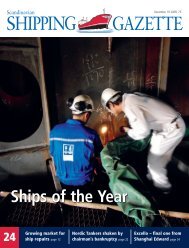SSG No 20 - Shipgaz
SSG No 20 - Shipgaz
SSG No 20 - Shipgaz
You also want an ePaper? Increase the reach of your titles
YUMPU automatically turns print PDFs into web optimized ePapers that Google loves.
TOVE SVENSSON<br />
roundings from our own assumptions<br />
and points of references from religion,<br />
history, climate and so on. The decoded<br />
message is then transferred to our way of<br />
being with regard to working methods,<br />
conflict solving, gender roles, games and<br />
food.<br />
– A culture clash is often the result of a<br />
misinterpreted decoding of the signal. And<br />
unfortunately, we often decode the signals<br />
as being negative, or perhaps neutral. Only<br />
rarely do we decode them in a positive way,<br />
says Erik Hemming.<br />
The difference in socio-material conditions<br />
for the crew, for instance working<br />
hours, cabin standard and other hygiene<br />
factors can sometimes act as a barrier to<br />
good communication.<br />
To avoid the sense of “us and them”<br />
onboard, Erik Hemming says it is important<br />
to do things together and communicate<br />
beyond the work-related order giving.<br />
In his opinion, this should come from<br />
higher ranks and down, since it is not as<br />
A.P. MøllER-MæRSk<br />
easy for the lower rank AB to knock on<br />
the chief mate’s cabin door and propose a<br />
mutual cup of coffee, as it would be the<br />
other way around.<br />
– By spending time together you learn<br />
to decode each other’s signals in a correct<br />
way. It is a matter of give and take. Anyway,<br />
it must be boring to spend a long time<br />
together on a ship and not communicate,<br />
says Erik Hemming.<br />
A door opener<br />
Another good example is learning at least<br />
a few phrases in the other language or languages<br />
spoken onboard. Just a few words<br />
can be a door opener and a source of many<br />
laughs.<br />
Poor communication between crew<br />
members from the same culture and<br />
speaking the same language can be a safety<br />
threat through misunderstandings and<br />
mistakes. It is only natural that the odds<br />
on miscommunication are increased when<br />
crew members are further hampered by<br />
cultural differences and speak English as<br />
a second language. According to a paper<br />
written by Robyn Pyne at the University<br />
of Plymouth and Thomas Koester at Force<br />
Technology in Denmark, failures in effective<br />
crew communication have played a<br />
central role in a number of maritime accidents.<br />
On the Sally Maersk a Polish repairman<br />
died from pneumonia when he was unable<br />
to communicate with the officer who was<br />
trying to treat him. His shipmates thought<br />
he was suffering from back pain after an<br />
earlier injury.<br />
Extreme example<br />
The bulk carrier Bright Field, which ran<br />
into a shopping complex in New Orleans<br />
in 1996, leaving 66 people injured,<br />
illustrates an extreme situation with a<br />
crew and a pilot from different cultures:<br />
American and Chinese. The word “no”<br />
is a very impolite word to the Chinese,<br />
A crewmember of the Sally Maersk died<br />
tragically due to problems of communication<br />
onboard.<br />
especially to an authority such as a pilot.<br />
Since the pilot was not able to understand<br />
the communication in Chinese between<br />
the engine room and the bridge, he was<br />
left unaware of the engine problems and<br />
could take no preventive action to mitigate<br />
the accident.<br />
It is no doubt difficult for seafarers that<br />
communicate in their native languages<br />
and perhaps simplified<br />
English in their day-today<br />
communication to<br />
suddenly muster a good<br />
command of a standard<br />
marine vocabulary<br />
according to the<br />
STCW convention,<br />
when an emergency<br />
situation occurs. Erik Hemming.<br />
What you can do is decide,<br />
if you want to be limiting<br />
or non-limiting in your<br />
communication, listening<br />
or non-listening.<br />
Pyne and Koester believe improved crew<br />
communication through training and education<br />
can reduce the risk of accidents as<br />
long as it is based on fundamental knowledge<br />
of the dynamics of crew interaction<br />
and communication.<br />
Leadership onboard necessitates crosscultural<br />
competency to revoke cultural<br />
differences in order to get the best out of<br />
a multicultural team. Less than ten per<br />
cent of our communication is verbal, the<br />
rest is non-verbal like in the quality of our<br />
voice, gestures, facial expressions and body<br />
language. It is the non-verbal communication<br />
that reflects a person’s thoughts and<br />
wishes.<br />
– We are mentally unaware of a large<br />
part of our communication and control<br />
may be two per cent. The rest is done without<br />
us thinking of it, says Erik Hemming<br />
and continues:<br />
– But what you can do is decide, if you<br />
want to be limiting or non-limiting in<br />
your communication, listening or nonlistening.<br />
You have the choice to open up<br />
professional communication.<br />
cecilia österman<br />
SCANDINAVIAN SHIPPING GAZETTE • OCTOBER 26, <strong>20</strong>07 13



